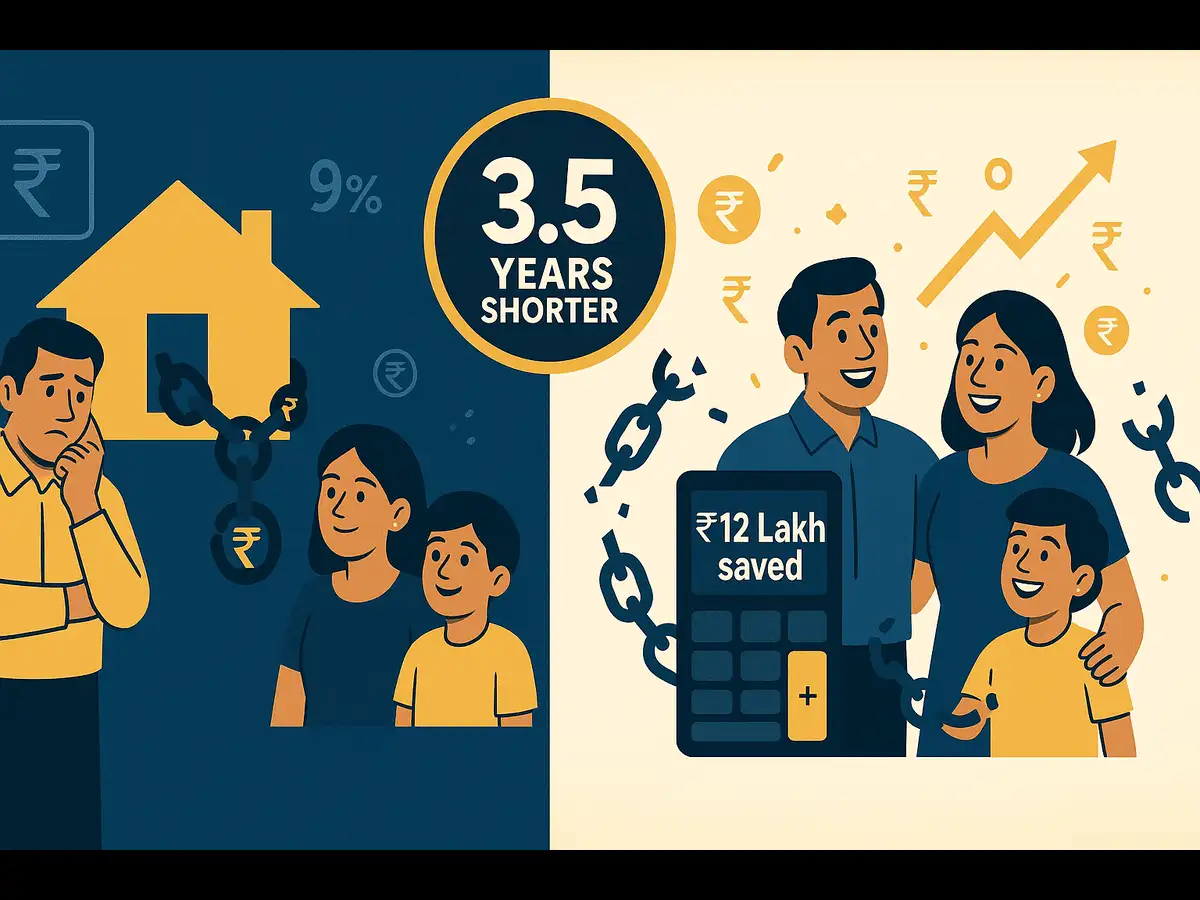Copyright indiatimes

Purchasing a home is a once-in-a-lifetime experience for many homebuyers who push their budgets to the limit and secure a home loan to acquire their dream house. Since buying a house is a significant expense, the repayment period is extended to make it manageable. Home loan tenures typically span from 15 to 30 years, resulting in 180-360 monthly repayments or equated monthly installments (EMIs).Income Tax GuideIncome Tax Slabs FY 2025-26Income Tax Calculator 2025New Income Tax Bill 2025However, it’s equally true that nobody wants to carry a huge financial burden like a home loan for too long. So, most borrowers look for ways to shorten their repayment, and the good news is that prepayments can really help with that.Consider a home loan of Rs 50 lakh at 9% interest for 20 years. Your monthly EMI would be approximately Rs 45,000, and over the loan tenure, you'd pay a staggering Rs 57.5 lakh in interest alone, which is actually more than the principal amount itself!Now, picture this: You make a partial prepayment of Rs 5 lakh in the fifth year of your loan. If you choose to reduce your tenure while keeping the EMI constant, you could cut down your repayment period by almost 3.5 years and save approximately Rs 12 lakh in interest. That's a whopping 140% return on your Rs 5 lakh prepayment, far better than many conservative investment options available today.Also read | Can a bank reject your home loan application if your monthly income is Rs 35,000? Know what expert saysThe longer the repayment period, the higher the interest paid. The interest component in your EMI is especially high in the initial years of the loan due to a higher outstanding loan amount. For this reason, many experts advise paying a larger down payment at the very beginning of the loan to cut down the overall interest burden.Even so, many borrowers' financial situations do not allow them to pay a hefty down payment initially, which is why choosing a good prepayment strategy later that fits their financial situation becomes their best bet to save on high interest outgo.How should you prepay your home loan?If you decide to prepay, your approach matters as much as the decision itself. There are various ways borrowers can make prepayments:1. A one-time substantial lump sum prepaid early on can create a huge impact in saved interest. Any money received as annual bonus, tax refunds, or any one-time income can be used for this purpose.2. Systematically setting aside a fixed amount every month or quarter for prepayment, similar to a systematic investment plan (SIP).3. Small but regular partial prepayments with gradual increase as income increases.“So, say you get a salary hike of about 7%. So, in our example of a Rs 75 lakh home loan for 25 year tenure at about 8.0%, with a regular monthly EMI of Rs 57,886, if you increase the EMI next by 7%, then the EMI would be Rs 61,938 in the 2nd year, and Rs 66,274 in the 3rd year and so on. In this case, the home loan gets over in about 12-13 years. And the interest burden reduces to Rs 49 lakh across the repayment period instead of the original Rs 98-99 la.” says Dev Ashish, Founder, Stable Investor.Ashish adds that if you are keen on speeding things up and have the extra cash to combine both strategies -- paying one additional EMI each year and raising your monthly EMI by 7% annually -- then you can wrap up your loan quite quickly. How fast? Your 25-year home loan can be paid off in roughly 11 years! Plus, the interest burden in this case is significantly lower at around Rs 34 lakh.The following table shows the impact of above prepayment strategies for a Rs 75 lakh home loan taken for a tenure of 25 years at an interest rate of 8.0%: Impact of prepayment strategies on home loans* Sr. No. Prepayment Strategy Reduced Tenure Interest Savings (Rs) 1 Paying 1 extra EMI every year 6-7 years 24-25 lakhs 2 Gradually increasing EMI amount by 7-8% 12-13 years 49-50 lakhs 3 Paying 1 extra EMI + Gradual increase in EMI 14-15 years 54-55 lakhs Source: Dev Ashish, Founder, Stable InvestorThese are just some of the popular methods of prepayment, with most borrowers usually going for a hybrid method that best suits their financial situation. Though regular smaller prepayments often outperform a single large prepayment due to compounding effects, many find this easier than parting with a lump sum amount.When should you prepay your home loan?Irrespective of loan amount, tenure, or EMI, since interest dominates your EMI for the first 5-7 years of the loan tenure, the golden rule of prepayment is deceptively simple: prepay early, save big.However, prepayment of home loan should be thought of while considering other financial obligations and factors such as below:1. Avoid compromising on essentials: Liquidity considerations shouldn't be overlooked. Locking all your cash into prepayment when you might need funds for emergencies, children's education, or other goals could force you to take expensive personal loans later.Before prepaying aggressively, ensure you maintain an emergency corpus covering at least 6-12 months of expenses.2. Prepayment vs investment with better returns: An equity investor who stays disciplined and thinks long term could gain more by putting their money into equity mutual funds. Although past performance is not a guarantor of future results, it does provide a general idea of what to expect in terms of returns.According to the Value Research data on 28 October 2025, the average annual return (CAGR) for the equity large cap fund category over the last decade has been 12.77% . Meanwhile, equity mid cap and small cap fund categories have seen returns exceeding 16% in the same period.A differential of 3-6% in your home loan rate, compounded over decades, could mean significantly greater wealth creation. But at times when fixed deposit rates barely beat inflation, the certainty of saving on loan interest becomes attractive.3. Pay higher-interest debt first: If you're carrying another debt which has much higher interest rate, then your priority should be to close that debt and not to go for home loan prepayment as home loans typically come at a lowest interest rate compared to other secured and unsecured credit options.For instance, credit card revolving debt at 36-42% annual interest and personal loans at 12-15% interest, should be the first target of prepayment. Paying off a debt that is costing 15% interest makes more sense than prepaying a loan costing 9%.4. Loan stage: If you are in the last stages of your loan and have already paid off, say, 12-15 years of EMIs on a 20-year tenure, then the interest component will be minimal, and investing your money elsewhere might create more value. However, if you are in the first half of your repayment tenure, then making prepayments will have a bigger impact. But, for people nearing retirement, becoming debt-free before retirement might be worth prioritizing over marginal investment returns.Moreover, when the interest rate cycle is in your favour and interest rates have fallen, making partial prepayment will further accelerate your repayment.5. Tax implications: For old regime taxpayers, the interest you pay on your home loan is deductible up to Rs 2 lakh under Section 24(b), while the principal repayment qualifies for deduction under Section 80C (up to Rs 1.5 lakh).If you prepay your loan aggressively, your yearly interest payment might drop below Rs 2 lakh, and tax benefit will be underutilized. Many smart borrowers keep their loans running to claim this maximum deduction every year."So I got money, but I needed it for some other purpose, but first I prepaid the loan, so now I am tighter on liquidity, or I have to then redeem from some investment, which may turn out to be not at the best of time, etc., to take care of that other liquidity requirement, that's one," says Lovaii Navlakhi, MD and CEO of International Money Matters Pvt Ltd.The other thing, Navlakhi continues, is that people would normally look at the loan repayment directly as cost. So, if the cost is 10%, 7%, or 9%, people don't see if they were getting any tax benefit on that borrowing, and if there was, then they should evaluate things post-tax.What should you do about home loan prepayment?There's no one-size-fits-all answer regarding home loan prepayment. For some, the guaranteed savings and mental peace of early loan closure are invaluable. For others, investing surplus funds creates more long-term wealth.You must regularly monitor and optimize your debt strategy -- whether that means aggressive prepayment or strategic retention of low-cost loans -- while building wealth elsewhere.With RBI guidelines removing penalty barriers on floating rate loans and digital financial tools making calculations simple, you have the flexibility to choose, or even change, your strategy as your life evolves.Disclaimer: *Calculations are illustrative. Actual results may vary based on your specific loan terms and profile.



